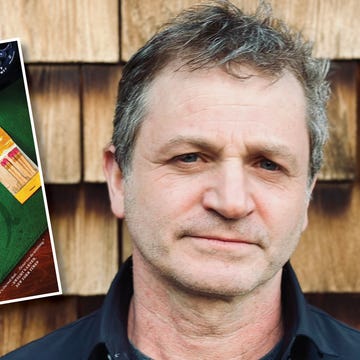Forrest Gander and Tayi Tibble may be separated by continents (and decades), but this pair of writers are connected by their mutual devotion to the poet’s life. Their individual bodies of work reflect an urgency and a desire to welcome readers into the intimate parts of their minds—or at least to get those parts on the page. Join us for their conversation about poetry’s intersections with embodiment and provocative emotions, and a deep dive into how translation and language play a role in their work, as part of Alta Live’s Writers on Writers series and our Issue 25, The Writers Issue.
About the guests
Forrest Gander was born in the Mojave Desert and grew up in Virginia. He is a writer and translator with degrees in geology and English literature. Among his recent books are Be With, winner of the 2019 Pulitzer Prize, and Core Samples from the World, a Pulitzer and National Book Critics Circle Award finalist. His translations include Then Come Back: The Lost Neruda, Fungus Skull Eye Wing: Selected Poems of Alfonso D’Aquino, and Pinholes in the Night: Essential Poems from Latin America (with Raúl Zurita), all from Copper Canyon Press. The Adele Kellenberg Seaver Professor Emeritus of Literary Arts & Comparative Literature at Brown University, Gander lives in Northern California.
Tayi Tibble (Te Whānau ā Apanui/Ngāti Porou) was born in 1995 and lives in Wellington, New Zealand. In 2017, she completed a master’s degree in creative writing from the International Institute of Modern Letters, Victoria University of Wellington, where she was the recipient of the Adam Foundation Prize in Creative Writing. Her second book of poetry, Rangikura, will be published in the United States in 2023.
About their books
Knot: The elements are timeless and fundamental—a male nude and a piece of black linen—and the photographic results are miraculous. Within Knot are 23 lush black-and-white photographs of a body and cloth performing a provocative ballet, a wrestling match, a tense sequence of appearances and disappearances that immediately take on symbolic weight. When poet Forrest Gander first encountered these images, he asked Jack Shear for more. As Gander recalls, the photographs arrived “dreamy, violent, mythic, and elemental.… I set them up around the room and knew I wanted to write my way into them.” The result is a profound dialogue between word and image, observation and inspiration, imagination and intellect. “What do you see?” one poem wonders aloud. “A divinity wrung from a black cloud.”
Poūkahangatus: The American debut of an acclaimed young poet as she explores her identity as a 21st-century Indigenous woman. Poem by poem, Tayi Tibble carves out a bold new way of engaging history, of straddling modernity and ancestry, desire and exploitation.
Intimate, moving, virtuosic, and hilarious, Tibble is one of the most exciting new voices in poetry today. In Poūkahangatus (pronounced “Pocahontas”), her debut volume, Tibble challenges a dazzling array of mythologies—Greek, Māori, feminist, Kiwi—peeling them apart, respinning them in modern terms. Her poems move from rhythmic discussions of the Kardashians, sugar daddies, and Twilight to exquisite renderings of the natural world and precise emotions (“The lump in her throat swelled like a sea that threatened to take him from her, and she had to swallow hard”). Tibble is also a master narrator of teenage womanhood, its exhilarating highs and devastating lows; her high-camp aesthetics correlate to the overflowing beauty, irony, and ruination of her surroundings.
These are warm, provocative, and profoundly original poems, written by a woman for whom diving into the wreck means taking on new assumptions—namely, that it is not radical to write from a world in which the effects of colonization, land, work, and gender are obviously connected. Along the way, Tibble scrutinizes perception and how she as a Māori woman fits into trends, stereotypes, and popular culture. With language that is at once colorful, passionate, and laugh-out-loud funny, Poūkahangatus is the work of one of our most daring new poets.
About Alta’s Writers on Writers series
Celebrating writers and their work is one of the core missions of Alta Journal, and we’re proud to work with some of the West Coast’s best. But how do writers like C Pam Zhang, Forrest Gander, and Lydia Kiesling make the magic that results in our inevitable need to read one more chapter, turn one more page, and devour one more poem? Alta’s Issue 25, The Writer’s Issue not only examines the practice and art of writing but also includes a special pull-out guide to 126 books written by Alta contributors over the past two years. Alta Live, our Wednesday Zoom interview series, takes this focus on authors one step further with our Writers on Writers series that will feature noted authors and Alta contributors in conversation with one another. Throughout the month of October, Alta Live will exclusively offer intimate, eye-opening, and hopefully extremely fun discussions between two writers working in the same genre.•














